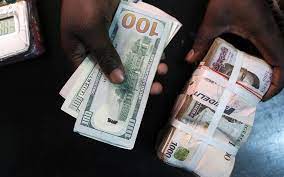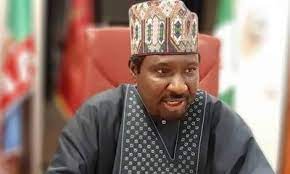Last week Wednesday, debate held by Senators on way out of planned Naira notes re – design by the Central Bank of Nigeria (CBN) led to a rowdy session. TAIYE ODEWALE reports
History of Naira notes redesigns in Nigeria
A total of 10 changes have been made to the country’s currency since it gained independence in 1960.
The first of such changes or redesign was the one done in 962 with change in its currency form depicting Nigeria as an Independent country unlike before when it was under the British rule.
Symbolically, the inscription ‘Federation of Nigeria’ was replaced with ‘Federal Republic of Nigeria’ on the notes.
The second change was in 1973 when the currency itself was changed from Pound to Naira. A Naira at the time was equal to 10 shillings while 100 kobo became one naira.
The third was in 1977 when a new ₦20 banknote was introduced. At that time, it was the highest banknote in the country with corresponding purchasing value.
The CBN under military regime of the then Head of State, Lt – General Olusegun Obasanjo, introduced the note because of the development of the country’s economy and to immortalise General Murtala Muhammed who was assassinated as Head of State on Friday, February 13, 1976.
The note gave people the freedom to hold a lot of money in few notes instead of holding a lot of banknotes.
Another Naira notes redesign took place in 1979 with introduction of three new banknotes which were one naira, five naira and ten naira (₦1, ₦5, ₦10) respectively.
In order for people to be able to recognize and differentiate them, they were made of different colours aside culture showcasing pictures inscribed on their back .
In April 1984, as a way rendering valueless, Naira notes believed to have been stolen by some corrupt politicians of the second republic, the military regime headed by Major – General Muhammadu Buhari (rtd), changed all colours of the banknotes except the 50 kobo which as declared by CBN then, was to control the withdrawal of the money to foreign countries.
The 1984 exercise was the shortest in the history of the country which spanned just eleven days.
In 1999 under President Olusegun Obasanjo, steps were taken to expand the country’s economy and facilitate trade with introduction of ₦100, ₦200, ₦500 and ₦1000 notes which came into transactions at different times from December 1999, November 2000, April 2001 and October 2005 respectively.
In 2007, as part of the economic reforms, a polymer N20 banknote was introduced for the first time. The features of N50, N10, N5 as well as N1 and 50 kobo coins were also changed while N2 coin was introduced.
In 2009, as a result of the benefits that the government said it saw in changing the N20 note to polymer, it changed the N50, N10 and N5 notes to polymer.
In 2010, the CBN introduced a new N50 naira note to celebrate Nigeria’s 50th anniversary while in 2014, the apex bank redesigned N100 note to celebrate the 100th anniversary of Nigeria’s amalgamation between northern and southern entities in 1914.
The latest plan on Naira notes re – design .
On 26th October 2022 , CBN announced the introduction of new Naira notes which will come into circulation on December 15th, 2022, whilst existing Naira notes will remain legal tender until January 31, 2023.
The CBN governor, Godwin Emefiele who made the announcement at a press briefing in Abuja, said that the exercise would affect the the highest denominations: 200, 500, 1000 notes.
He said that the action was taken in order to take control of the currency in circulation, alleging that the bulk of the nation’s currency notes were outside bank vaults and that the CBN would not allow the situation to continue.
The new notes as stated by him , will be released for public use on December 15, 2022 and circulate together with the old ones for six weeks until January 31, 2023 when the old notes would cease to be legal tender.
“As you all may be aware, currency management is a key function of the Central Bank of Nigeria, as enshrined in Section 2 (b) of the CBN Act 2007. Indeed, the integrity of a local legal tender, the efficiency of its supply, as well as its efficacy in the conduct of monetary policy are some of the hallmarks of a great Central Bank.
“In recent times, however, currency management has faced several daunting challenges that have continued to grow in scale and sophistication with attendant and unintended consequences for the integrity of both the CBN and the country”, he had said .
Debate in Senate on the planned monetary policy
As a way of giving the Naira notes re – design policy, required legislative backing, the Chairman of the Senate Committee on Banking, Insurance and other Financial Institutions, Senator Uba Sani (APC Kaduna Central), sponsored a motion on the floor of the Senate on Wednesday last week for required debate among Senators and resolutions to that effect by the Senate.
But while the expected resolutions on legislative support for policy were achieved, the debate on it was more of babel of voices as Senators disagreed on time frame given for the exercise.
Trouble started on the debate when senators Ali Ndume, Abiodun Olujimi, Betty Apiafi, Barau Jibrin, Chukwuka Utazi, and Orji Uzor Kalu, supported the CBN policy but suggested the extension of the deadline for compliance.
Kalu, specifically, wanted the Senate to invite the Governor of the CBN, Godwin Emefiele, to throw more light on the policy while he should be persuaded to extend the deadline to April 30, 2023.
Similarly, Senator Abiodun Olujimi, also said one and half month was too short to withdraw all the money in circulation to avoid shutting down the economy.
Senator Betty Apiafi said rural banking had been shut down hence the January deadline should be extended.
Countering, she added, wasn’t enough to change the naira stressing that the implications of the redesign should be criticality examined in view of the fact that bandits have said they would be collecting ransom in foreign currencies.
In his own submissions, Senator Jibrin Barau, said naira redesign cannot halt terrorism but could only reduce it just as Senator Chukwuka Utazi posited that the rural nature of the country, required the leadership of the Senate to interface with the CBN governor to explain the implications on the peculiarity of the country.
But Senator Gabriel Suswan disagreed with Kalu and others claiming that the CBN governor had always shunned the Senate invitations and, therefore, urged his colleagues to ignore the CBN policy and let the country damn the consequences.
They were all, however, countered by Senator Bassey Akpan who said there should be no discussion on the matter since the extant laws give the Apex bank prerogative of actions on what should be done.
Akpan’s submissions which did not go down well with those seeking for extension of the deadline, turned the session into a rowdy one as it took persistent appeals by the presiding officer, Omo-Agege, to restore normalcy after about 15 minutes of hot arguments among the senators.
With three weeks to the commencement of Naira notes re – design, Nigerians are obviously waiting for the impact the exercise would have on the value of Naira in particular and the economy in general.




